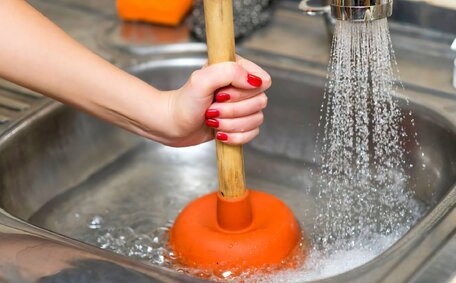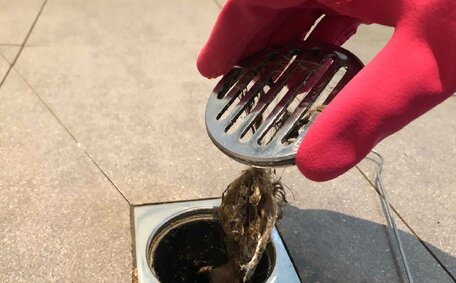Introduction: The Importance of Drain Maintenance for Restaurants
Keeping drains clear and functional is critical for restaurants, whether they’re in Strathfield, Sydney or bustling New York. Blocked or damaged drains can result in plumbing emergencies, health code infractions, and could even cause your restaurant to shut down. Proper drain maintenance is as necessary in New Jersey as it is elsewhere, helping restaurants adhere to strict food safety standards by preventing backups of wastewater, grease buildup, and pest infestations.
Drain maintenance should be a top priority for every commercial kitchen, just as it is in your home. Grease, food scraps, and other debris can easily accumulate in drains and lead to clogs if not regularly cleaned. Clogged drains create breeding grounds for bacteria that can lead to foodborne illnesses and attract pests like rats or cockroaches, jeopardising food safety compliance and necessitating pest control measures.
Accumulated grease and blockages can damage your plumbing over time, while leaky drains pose a risk of spreading contamination in your kitchen.
Drain backups can lead to water damage and flooding, disrupting operations and risking contamination in dining areas. Routine drain care ensures your system can avoid issues that can become costly problems and the repairs that come with them.
Strathfield Plumbing is well-versed in the specific drain cleaning and maintenance requirements of commercial kitchens like yours. Your team of licenced plumbers at Strathfield Plumbing specialises in commercial drain services to keep your restaurants’ kitchen operations running smoothly. We offer regular maintenance for kitchen drains like grease trap pumping, hydro jetting, descaling, and drain clearing. Trust us to handle all your restaurant’s drain care needs.
Use Drain Covers and Strainers
Implementing drain covers and sink strainers is an effective strategy to prevent debris accumulation in your drains. Drain covers, including drain grates or wire mesh screens, fit over sink and commercial floor drains to catch solids, preventing them from entering the plumbing system.
Sink strainers, fine screens fitted in sink drain openings, help filter out food scraps and oils, preventing clogs in your pipes. Common strainer types include basket strainers, disc strainers, and sink traps. Changeable filter inserts are also available for enhanced filtering.
According to food safety organisations, restaurant cleaning protocols must include properly protecting every commercial kitchen drain. Drain covers and strainers assist restaurants in meeting these mandatory standards.
Drain covers and strainers prevent blockages by capturing solid materials and reducing grease, fats, and oils accumulation. They also prevent objects like utensils, food waste and paper towels from washing down drains where they can snag and create conditions for drain flies and cause clogs.
Consistent maintenance of your restaurant drain covers and strainers is essential to remove minor clogs effectively. Food particles and grease buildup will impair their effectiveness. Instruct your employees to clean the sink strainers daily and remove any accumulated fats and grease.
For assistance with selecting and installing suitable drain covers and strainers for your restaurant, reach out to Strathfield Plumbing. Keeping these preventative tools well-maintained will go a long way towards protecting your drains.
Proper Grease Disposal
Proper disposal of fats, oils and grease (FOG) can help your restaurant’s plumbing maintain tip-top condition and prevent issues. Grease, along with food particles, is one most common causes of drain blockages when they go into your drain systems in commercial kitchens.
Ensure that all used cooking oil and grease are disposed of into a grease receptacle to prevent clogs in your drains. Grease receptacles are specially designed containers with locking lids to securely hold FOG waste, keeping it from going down sink drains. Dumping FOG down sinks or floor drains can lead to buildup in pipes that impedes water down and prevent clogged systems from functioning properly.
Train your staff to scrape off grease residues from plates and cookware before washing. To reduce the buildup of oils fats, ensure food scraps end up in the garbage, not the drain. Additionally, Dry wipe surfaces to remove fats oils grease before mopping floors to prevent FOG from entering floor drains.
Improper grease disposal can affect your guests’ experience and can also lead to clogged drains, sewage backups, potentially affecting your business. Frequent grease trap cleaning is also essential. The professionals at Strathfield Plumbing can ensure your grease traps are properly installed and maintained to keep restaurant drains clear.
Clean Grease Traps Regularly
Cleaning and maintaining grease traps regularly is one of the most important preventative measures a restaurant can take to keep drains clear. Knowing how much your grease trap is used will determine how frequently it must be cleaned to comply with plumbing codes and food safety regulations.
Grease traps are essential fixtures in helping get your kitchen up to code, designed to intercept fats, oils and grease (FOG) waste before they enter the drainage system. By capturing FOG and any other contaminants, grease traps can reduce blockages in the main drain line leading out of a restaurant.
If neglected, grease trap maintenance might result in thickened grease overflowing into the sewer drain pipe, causing clogs. Over time, a clog can obstruct water flow and lead to sewage backups. It’s crucial for restaurant staff to be vigilant for early signs of drain issues to address them before complete blockages occur.
To avoid emergency drain obstructions, grease traps should be thoroughly cleaned at least once a month. More frequent cleaning, such as weekly or fortnightly, may be needed for high-volume kitchens. Routine inspections should periodically involve emptying grease traps and checking baffles for grease buildup to determine cleaning frequency.
Strathfield Plumbing professionals are equipped to manage every aspect of grease trap and gas line maintenance, ensuring your restaurant drains remain clear and comply with regulations. Our experienced technicians follow best practices to safely and effectively clean your restaurant drain system on a schedule tailored to your kitchen’s needs.
Utility Sink Best Practices
Utility sinks in commercial kitchens require special attention to keep drains flowing properly. Unlike your kitchen sink used for food preparation, utility sinks are for cleaning tools, equipment and mopping. However, many staff mistakenly use them for dumping fats, oils and grease.
Educate employees to avoid pouring cooking oils, grease, or food waste down utility sinks.
These substances coat pipes and restrict water flow, causing clogs.
Reserve utility sinks strictly for cleaning activities, such as washing mops, emptying buckets, and cleaning tools. Avoid pouring solids down even these cleanup sinks. Remove debris and rinse thoroughly before draining mop water.
Check utility sink strainers often and clean frequently to remove any accumulated solids and ensure they remain clear of obstructions. A clogged utility sink prevents proper equipment cleaning and maintenance.
Adhering to best practices for utility sink use helps maintain the health of your restaurant’s plumbing system. The expert plumbers at Strathfield Plumbing can also advise your restaurant on utility sink care for optimal drain performance.
Avoid Garbage Disposals
Despite their convenience, garbage disposals often cannot cope with the high volume of food waste in restaurant plumbing systems. The high volume of food waste in commercial cooking can quickly overwhelm disposal units, leading to jams and clogged drains.
Instead of using garburators to grind up food scraps, restaurants should dispose of solids directly into the trash. Employees should be trained to scrape plates and dispose of all unused ingredients, trimmings and leftovers into proper waste bins before washing.
Allowing any solids to go down the drains, even through a garbage disposal, can build up over time and cause blockages. Coffee grounds, eggshells, rice, pasta and other foods do not break down sufficiently. The accumulation of these materials can quickly become a significant impediment to water flow down the drains.
For optimal health in a commercial kitchen, no food items should ever be disposed down sinks, ensuring you clear your drains properly. Garbage disposals also require a high volume from the water supply to operate correctly, which can strain the plumbing infrastructure.
Proper solid waste management can help keep your plumbing in optimal condition. Strathfield Plumbing offers resources to outline how prevent garbage disposal use altogether and implement waste sorting procedures in your restaurant. Keeping food scraps completely out of drains is the best prevention against clogs.
Use Bio-Enzymatic Drain Cleaners
Regular use of bio-enzymatic drain cleaners is an effective maintenance practice to maintain clear and free-flowing restaurant drains. These environmentally-friendly cleaners use natural enzymes and bacteria to break down organic matter like food waste, oils and grease that accumulate in drains.
Bio-enzymatic cleaners work to dissolve substances such as grease, starches, and hair that adhere to pipe interiors. The enzymes digest these substances, allowing them to wash away freely rather than sticking to drain walls and causing clogs.
For the safety of your bar or restaurant’s plumbing systems, bio-enzymatic products are a safer alternative to harsh chemical drain cleaners. They help rid drains of odours and prevent infestations of fruit flies or gnats that are attracted to lingering food residues.
Restaurants should check your water heater function regularly as part of preventative drain maintenance and pour a foaming enzymatic cleaner down each sink and floor drain weekly.
Let the cleaner sit for 10-15 minutes before flushing with hot water to ensure a thorough clean. The enzymes will digest any accumulated organic material. More frequent application may be needed for problem drains.
Incorporating bio-enzymatic drain cleaners into regular maintenance routines helps prevent drain blockages. Strathfield Plumbing recommends this safe, effective preventative measure to restaurant owners looking to avoid a clogged drain and maintain hygienic drains.
Regular Professional Drain Cleaning
At /p>
For restaurants, preventative maintenance should include professional hydro jetting every 2-3 months to clear drains. More frequent cleaning may be required for problem drains or high-volume kitchens. Our technicians can assess your drain usage and suggest an optimal cleaning schedule.
Beyond hydro jetting, our drain services include pipe descaling, chemical cleaning and camera inspections. Regular professional maintenance keeps drains free-flowing and helps avoid emergency clogs or plumbing issues down the line.
Rely on Strathfield Plumbing’s expertise to ensure your restaurant drains remain clear, clean, and in optimal working order through consistent drain cleaning and maintenance.
At Strathfield Plumbing, we offer specialised commercial drain cleaning tailored to the needs of local food service businesses.
Hydro jetting propels pressurised water through pipes to scour the interior walls and flush out accumulations.
For restaurants, preventative maintenance should include professional hydro jetting every 2-3 months to clear drains.Educate Staff on hygiene of restaurant drains. Foster a culture of accountability amongst your staff with regular checks to ensure alp>Designate staff to regularly inspect and clean all sink strainers, floor drains, and grease traps.
Educated and diligent employees can help prevent plumbing problems caused by clogged drains. Strathfield Plumbing can provide tailored training resources and advice about restaurant drai





